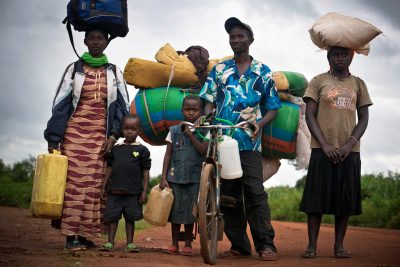By
Adisa Amanor Wilks
-
€14 million from the EU, yet Burundi still reels from unrest
-
opposition cries foul, says it has not been invited to talks
The European Commission has donated €5 million to help Burundians affected by the ongoing security crisis. Over 220 000 people, half of whom are children, are now estimated to have fled the country. This funding now brings the total support from the Commission to €14 million in 2015.
Since April this year almost a quarter of a million Burundians have fled to neighbouring countries such as Tanzania, Rwanda, the Democratic Republic of Congo (DRC) and Uganda.
“The humanitarian situation affecting Burundians is worsening. The refugee numbers are rising, with almost a quarter of a million people having now fled their homes. This is extremely worrying – both for Burundi, and for the neighbouring countries whose hosting capabilities have been stretched to the limit. Hosting government’s efforts in welcoming those who fled the violence are commendable. This additional EU funding will help address the refugees’ most pressing needs, notably in Tanzania. It will also contribute to humanitarian protection activities inside Burundi.” said EU Commissioner for Humanitarian Aid and Crisis Management Christos Stylianides.
On 25 April 2015, Burundian leader, Pierre Nkurunziza (who has been in power since 2005) announced that he would seek a third term in office. This provoked serious political division and since then Burundi has undergone sustained security and political crises, which has brought with it a refugee crisis. Mr Nkurunziza has since secured a third term in disputed elections in July.
Nkurunziza, an ex-rebel, was leader of a Hutu rebellion against the Tutsi-dominated armed forces in the early 90s. The unrest followed the assassination of the former president, Melchior Ndadaye, a Hutu, in 1993. The war lasted more than a decade (1993-2006) and left 300,000 people dead. This horrid past is what many fear could resurface if nothing is done now.
The Burundian capital, Bujumbura, is at the heart of the political turmoil. Last Friday, 87 people were killed in clashes there. More than 100,000 Burundians have so far fled to Tanzania, a country which is still hosting over 50,000 Congolese refugees.
Meanwhile, in a showdown with authorities in Burundi, the African is threatening to send a 5,000-person peacekeeping force but is giving Burundi until Tuesday to respond.
The Burundian government says it will not accept what it calls foreign soldiers.
Deputy presidential spokesman Jean-Claude Karerwa told AFP:“Burundi is clear on the matter: it is not ready to accept an AU force on its territory. If AU troops came without the government’s approval, it would be an invasion and occupation force, and the Burundi government would reserve the right to act accordingly.”
If successful, it will be the first time the African Union is invoking its rule to send peacekeeping troops to protect civilians.
The AU which has been meeting over the situation in Burundi, saying it will “not allow another genocide to take place on its soil.”
Talks between the government and opposition leaders are scheduled for December 28, but the main opposition coalition (CNARED group) says it has not been invited.
Next week’s negotiations will seek to end eight months of unrest.
Key facts about Burundi:
-
Burundi became independent in 1962
-
With GDP per capita estimated at $900, Burundi is the second poorest country in the world with a little over 10 million inhabitants.
-
The country witnessed its worst civil war between 1993-2005
-
85% of the population are Hutus. Tutsis make up 14%
Timeline of some key dates in Burundi’s history:
1890 – The kingdoms of Urundi and neighbouring Ruanda (Rwanda) incorporated into German East Africa.
1916 – Belgian army occupies the area.
1962 – Urundi is separated from Ruanda-Urundi and becomes independent.
1993 – Ethnic conflict claims some 300,000 lives.
2015 – Unrest over president’s plans to stand for re-election



No Comments Yet!
You can be first to comment this post!